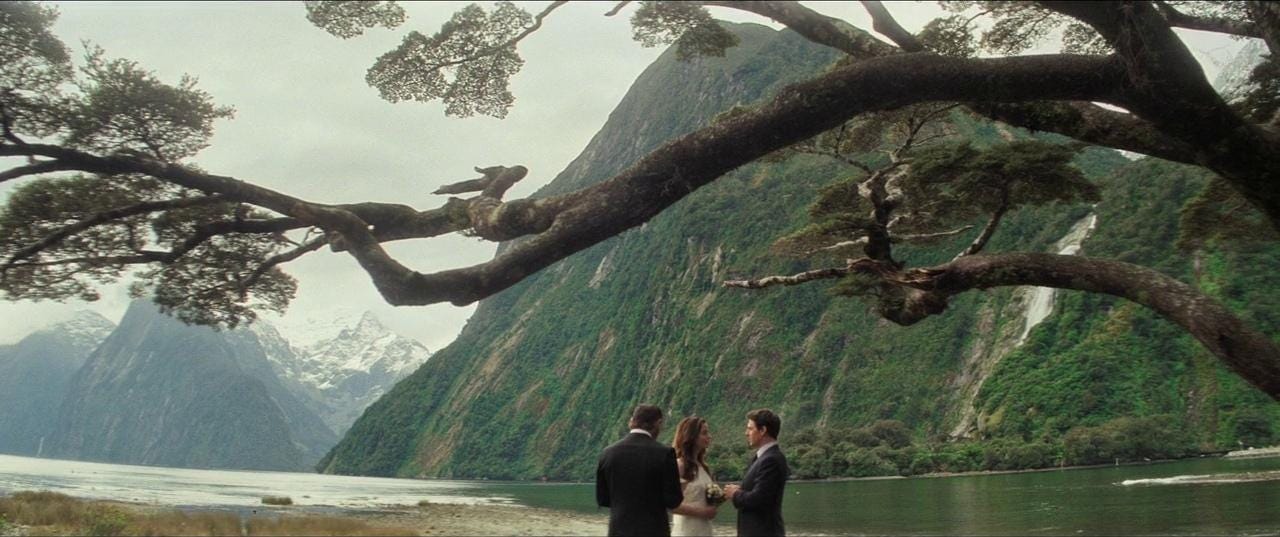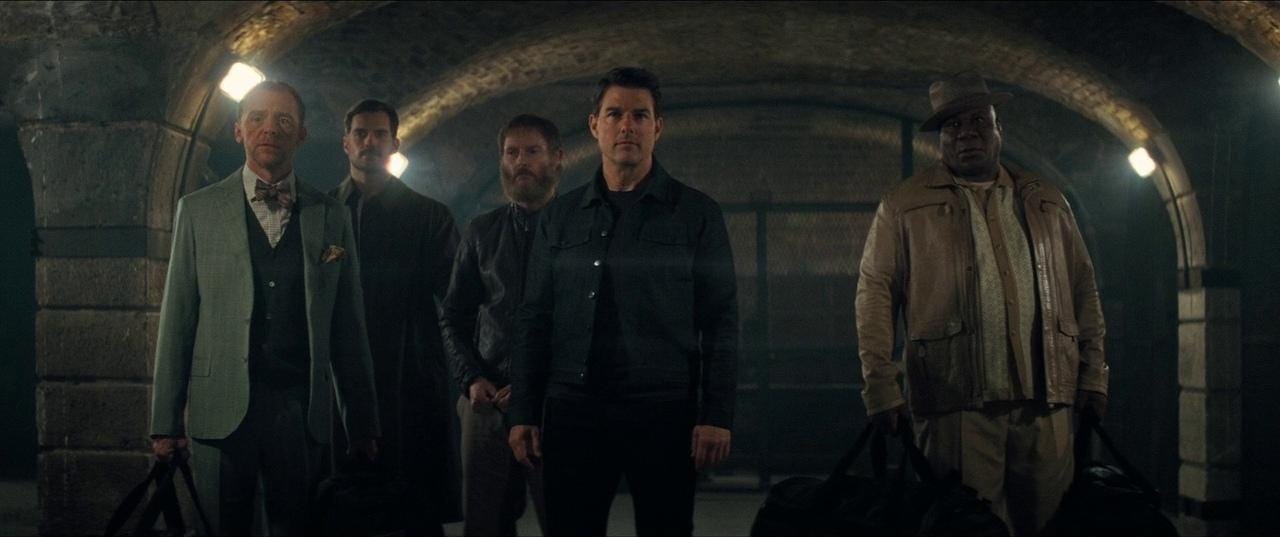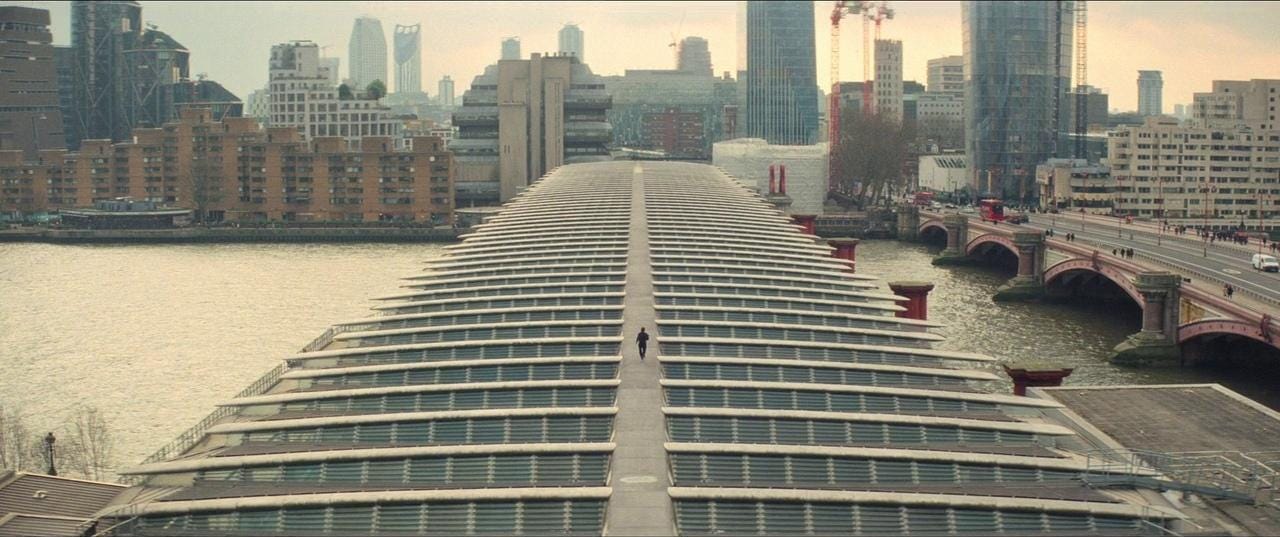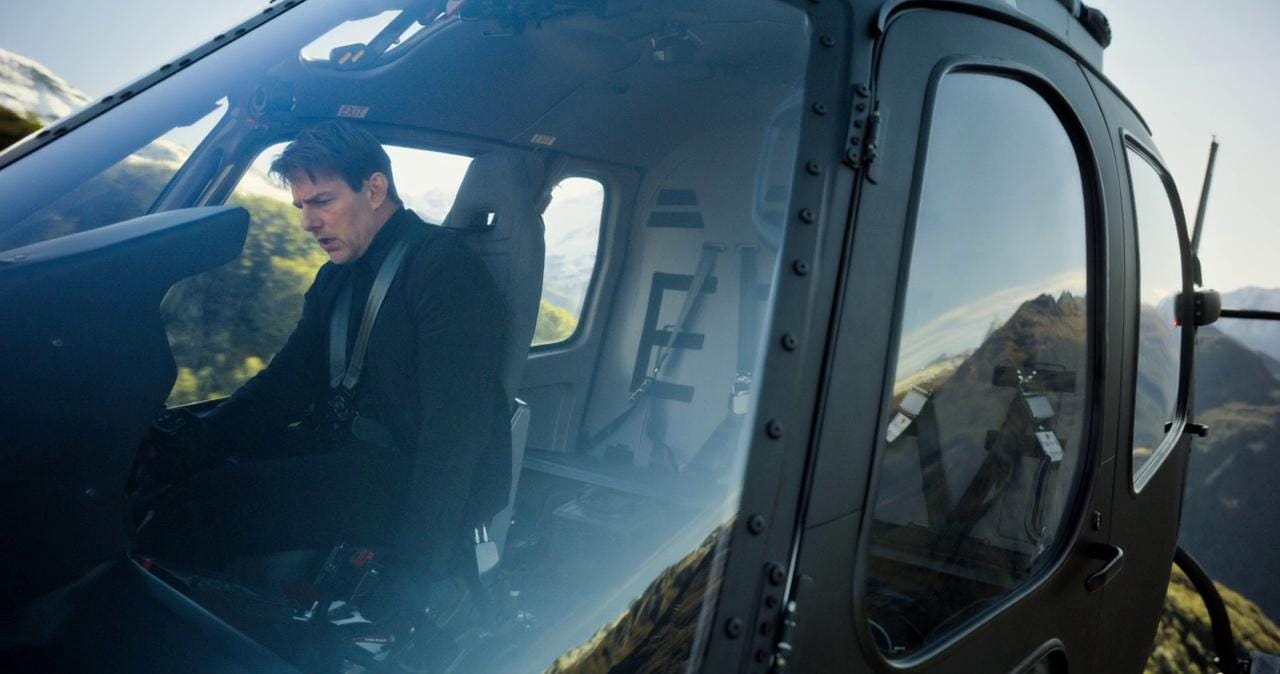Review: "MISSION: IMPOSSIBLE - FALLOUT" is one of the century's defining action epics
This one is truly 'Ethan's Odyssey'
“Fate whispers to the warrior.”
“A storm is coming.”
“And the warrior whispers back?”
“I am the storm.”
After Ethan Hunt engages in this prophetic code-phrase exchange, he is handed his latest mission orders inside a copy of Homer’s Odyssey. It’s a statement of narrative and thematic intent that would come across as absurdly pretentious were it not followed by two-and-a-half hours of the most ambitious and virtuosic action filmmaking ever achieved. Mission: Impossible - Fallout is an action epic made by the world’s most talented crazy people, and in the context of the series at large, it truly is Ethan’s ‘Odyssey’: a journey that takes him all over the world and well outside his already considerable comfort zone, confronts him with just about every kind of challenge imaginable, and which ultimately brings him back ‘home,’ to a firmer sense of who he is and why he does what he does. In so doing, Fallout performs the same kind of Odyssey for the series itself, not just crafting the greatest and grandest adventure the Mission: Impossible movies had seen so far, but cutting to the heart of what makes this such a uniquely appealing 21st-century film franchise.
Fallout is so ludicrously well-made, in all possible ways, that it’s hard to know where to begin. The film is in essence a feature-length chase sequence, with the direction, goal, and vehicle of that chase changing in several major ways – we’ve got motorcycles, cars, trucks, boats, helicopters, rock climbing, and, of course, Tom Cruise free running – with every inch of action shot on location to breathtaking effect. Fallout has a darker, more serious tone than any entry since the first film, without losing the humanity the series has had since the third (in fact, it’s enhanced). The film juggles a mind-boggling number of balls: the mystery of John Lark and the intrigue of Henry Cavill’s character; the return of Solomon Lane (Sean Harris) and the continuing threat of the Syndicate; Michelle Monaghan’s Julia reappearing both in Ethan’s subconscious and in his reality; Vanessa Kirby as a power broker crushing very hard on Ethan (understandable); Ilsa Faust once again playing the wild card; and another power struggle between the IMF and CIA. It is exceptionally difficult to make a movie that balances this many threads, and that moves through so many big twists and turns, without leaving the audience feeling jerked around, but Fallout is so nimble and deft that not only does it keep all these balls in the air without ever dropping a single one, it does so in a way that makes its considerable runtime feel positively brisk.
Fallout marks the first time a director returned to the franchise, with Christopher McQuarrie back in the director’s chair, and not coincidentally, it is the series’ first truly direct sequel, with most of the major players from the fifth film returning, relationships like Ethan’s and Ilsa’s deepening, and the enemies and threats of this adventure extending from the events of Rogue Nation (the ‘Fallout’ of the title is a double-entendre about nuclear war and the aftermath of Ethan bringing down the Syndicate). While not the most important strength of the film, I do think it's notable how McQuarrie clearly wants to tie the series together, keeping it moving forward while also investing in the continuity. Fallout nods to the very first Mission: Impossible with Kirby’s character, daughter of Vanessa Redgrave’s Max from the original entry, and more significantly, it brings back Monaghan as Ethan’s once-wife Julia. There is a particularly lovely little scene between her and Ving Rhames’ Luther that recontextualizes what happened with that marriage, and it not only helps smooth the otherwise abrupt transition from Mission: Impossible III to Ghost Protocol, but substantially deepens Ethan’s characterization, and starts to crystallize the logic of who exactly this guy is, as an actual person in the world of the film, work that would continue in Dead Reckoning. The McQuarrie films don’t feel dragged down by the weight of narrative connections, like some of the later Daniel Craig 007 films or recent Marvel movies, but do just enough to make it feel like this world has continuity and weight to it, and then leverage that work to create bigger stakes and greater emotional pay-offs.
In fact, the heart of this film stems from exploring the single most consistent piece of Ethan’s characterization across this long, strange, sprawling series: his refusal to sacrifice others for the sake of his mission. The action kicks off when Ethan gets prioritizes Luther’s life and, in the distraction, loses a set of plutonium cores that remnants of the Syndicate plan to turn into nuclear weapons. As Ethan and friends mount a counteroffensive, the film continually returns to and challenges Ethan with this dilemma, presenting him with more choices between his values and tactical expediency. Ethan could, for instance, do what The White Widow suggests and kill everyone on the scene to extract Solomon Lane, but he instead flips Lane’s transport van into the Seine and gets every cop and criminal in Paris on his tail; a few scenes later, he could also stand aside and let a bystander police officer get shot to keep her quiet, but instead speaks to her empathetically, blows his cover by stopping the Widow’s foot soldiers, and makes sure help is on the way before leaving. Solomon Lane’s big speech to Ethan in the sewers – “the fallout of all your good intentions” – espouses a belief that a better world cannot be built through morality, but only through compromise and sacrifice, while John Lark’s manifesto claims that peace is only achievable through suffering. Ethan is not only opposed to these people in goals, but in outlook and aspiration, too. And this time, there is a doubt inside Ethan that’s more prominent than in other entries. He never seems like he’s about to go off the edge and do something totally out of character, but he also seems deeply conflicted about whether his inability to sacrifice a friend or compromise his morals makes him too myopic, unable to save the forest for the trees.
Fallout is not subtle in its answer to this question – Angela Bassett tells us in narration, just before the film ends, that “we need people like [Ethan], who care about the one life as much as they care about the millions” – and I am honestly glad that it isn’t. Beloved as these films are, I know there is a thread of criticism, particularly around the later entries, that sees Ethan’s characterization as too ‘saintly,’ a messianic figure who does no wrong and feels like a particularly self-aggrandizing version of Tom Cruise’s star persona. I see where this argument comes from – Ethan is absolutely validated and venerated to a high degree within the worldview of these films – but I think I come at these movies from a fundamentally different angle, one in which the character’s aspirational qualities feel increasingly vital and meaningful to me in the sociocultural context in which these films exist.
As I said in my piece on the first film, I’m only a few years older than the Mission: Impossible movies themselves. And that means I grew up in an American media environment that prioritized moral compromise above all else. Our heroes, on Emmy-winning hit TV shows like 24, were men like Jack Bauer, who maimed and tortured their way to saving the day. The most widely acclaimed superhero film of the century, The Dark Knight, ends with Batman killing a man to save a child, and being declared “the hero Gotham deserves.” And even these proudly compromised heroes were few and far between, as the post-Sopranos TV boom of the 2000s saw the ‘anti-hero’ elevated as the central narrative archetype. This February, Vince Gilligan, creator of Breaking Bad and Walter White, admitted to a sense of guilt over his part in this media landscape, saying at this year's WGA Awards:
“All things being equal, I think I’d rather be celebrated for creating someone a bit more inspiring. In 2025 it’s time to say that out loud, because we are living in an era where bad guys – the real-life kind – are running amok. Bad guys who make their own rules, bad guys who – no matter what they tell you – are really out for themselves … Fictional bad guys [have stopped] being the cautionary player that they were created to be. God help us, they’ve become aspirational. So maybe what the world needs now are some good, old fashioned, Greatest Generation types who give more than they take. Who think that kindness, tolerance, and sacrifice aren’t strictly for chumps.”
And this is where Ethan’s characterization in Mission: Impossible – a series that predates and has run in parallel to all of this – has only come to feel increasingly timely and necessary to me. Ethan’s ‘fault,’ as Fallout examines, is that he is overly attendant to individual lives, much more willing to risk himself than ever endanger an innocent (or even semi-innocent) bystander, and always putting the lives of his friends and loved ones above his own, even when it makes the mission exponentially harder. Ethan isn’t just the guy who accepts impossible missions: he’s the guy who will make missions impossible by insisting on doing them without collateral damage.
But instead of ever framing this as a weakness on Ethan’s part, each of the five films up to now have framed Ethan’s insistence on never taking the easy way out as aspirational. There is, in every one of these movies, an easier way for Ethan to get the job done: to kill someone, or let someone die, or indulge in a tiny bit of self-preservation and let the government that continually refuses to trust him sort things out for themselves. But he never succumbs to those possibilities, and by the time of Fallout, audiences had continued returning to the character for over two decades. Hunt is a character originally created in the Clinton 90s, but I think he wound up surviving to be one of the perfect heroes of the Trump years, decades later, because of how strictly he holds to a core set of humanist, empathetic values, willing the world he wants into being by refusing to believe there is a shortcut to saving lives. Fallout allows him the self-doubt that is a requisite part of being human, but also ultimately affirms his brand of heroism. And after years spent living in an era where vice has supplanted virtue as the core thing so many political and cultural leaders espouse, that doesn’t feel self-aggrandizing or messianic to me. It feels like hope. One of the most damnable myths we’ve told ourselves in the 21st century is that ‘old-fashioned’ heroism is somehow the easy way out. As Ethan will tell us in Dead Reckoning when Luther insists that “none of our lives can matter more than this mission,” “I don’t accept that.” The kind of heroism Fallout taps into feels more vital, more challenging, and more genuinely heroic than ever.
Lest I leave you with the impression Fallout is an entirely weighty and cerebral morality play, it bears underlining just how ridiculously entertaining this film is, and what an overwhelming masterclass in kinetic action filmmaking it delivers. Like Rogue Nation, this film puts one of its most daring stunts first – Ethan and Walker’s HALO jump into Paris through a lightning storm, shot with arresting clarity for IMAX and assembled to look like a single unbroken long take – and then dares itself to keep upping the ante, with the middle hour providing some of the most remarkable chase sequences of the modern era: by motorcycle, by car, and, of course, by foot. Indeed, by the ‘Tom Cruise running’ metric of Mission: Impossible quality, Fallout is a very real contender for the crown, with the foot chase in London following Ethan as he goes after Walker possibly standing as the current peak of Cruise’s propensity for running like a man possessed. All these terrific images of Cruise sprinting in front of various London vistas, jumping through windows and rushing across roofs, with the moment Cruise nearly missed a jump between buildings and broke his leg on camera left in the finished film? Yeah, pump this into my veins.
The final act of Fallout is the franchise ascending to a heretofore unimagined plane of action movie nirvana, a wildly creative kinetic symphony executed at an absurdly high level, and a great showcase of McQuarrie’s adeptness with creating and sustaining multiple planes of action at once. The climax here isn’t just one action sequence, but three: Luther disarming the first nuclear bomb, Ilsa and Benji going after the second while fighting Solomon Lane, and Ethan engaging in a full-blown helicopter chase with Cavill. That last part is the real showstopper, of course, a spectacular series of practical helicopter stunts shot with IMAX cameras for breathtaking, crystal-clear images; in retrospect, it feels like an obvious precursor to Top Gun: Maverick in how much it immerses the viewer in this incredible, wholly tactile, one-of-a-kind aerial cinematography.
But in terms of raw filmmaking craft, what I find most impressive is how McQuarrie weaves these planes of action together, each individual component building to separate mini-climaxes and cliffhangers, each effort scaffolding upon the other in gradually raising levels of exertion, with editor Eddie Hamilton assembling it all with razor precision at both the micro and macro level. The thrill lies not just in the individual images and stunts, but in how masterfully the film sells the illusion that each of these lines of action is reliant on the other, every character fighting against the same countdown clock. It certainly helps that the musical score, by Lorne Balfe, is the best Hans Zimmer score Zimmer never wrote (Balfe is a veteran of Zimmer’s Remote studio, so he very much comes from that school, and he’s learned all the right lessons). It lends an absolutely thrilling pulse to the movie that proves essential, especially at the end.
So yes: Mission: Impossible – Fallout is an all-around triumph, a film that felt in 2018 like both a culmination of everything this franchise had built thus far and a giant leap forward. There has never been another series where the sixth film arrived, 22 years into the run, and was almost universally hailed as the best one yet. In fact, I would wager Fallout is second only to Mad Max: Fury Road as the best live-action Hollywood blockbuster of the 2010s. It’s just that good.
And the craziest part? It’s still not my favorite Mission: Impossible. That one’s up next.
TOMORROW: Our retrospective catches up to the most recent film with MISSION: IMPOSSIBLE - DEAD RECKONING.
Read the book 200 Reviews by Jonathan R. Lack in Paperback or on Kindle
Subscribe to PURELY ACADEMIC, our monthly variety podcast about movies, video games, TV, and more
Like anime? Listen to the podcast I host with Sean Chapman, JAPANIMATION STATION, where we review all sorts of anime every week. Watch on YouTube or Subscribe wherever you get your podcasts.








